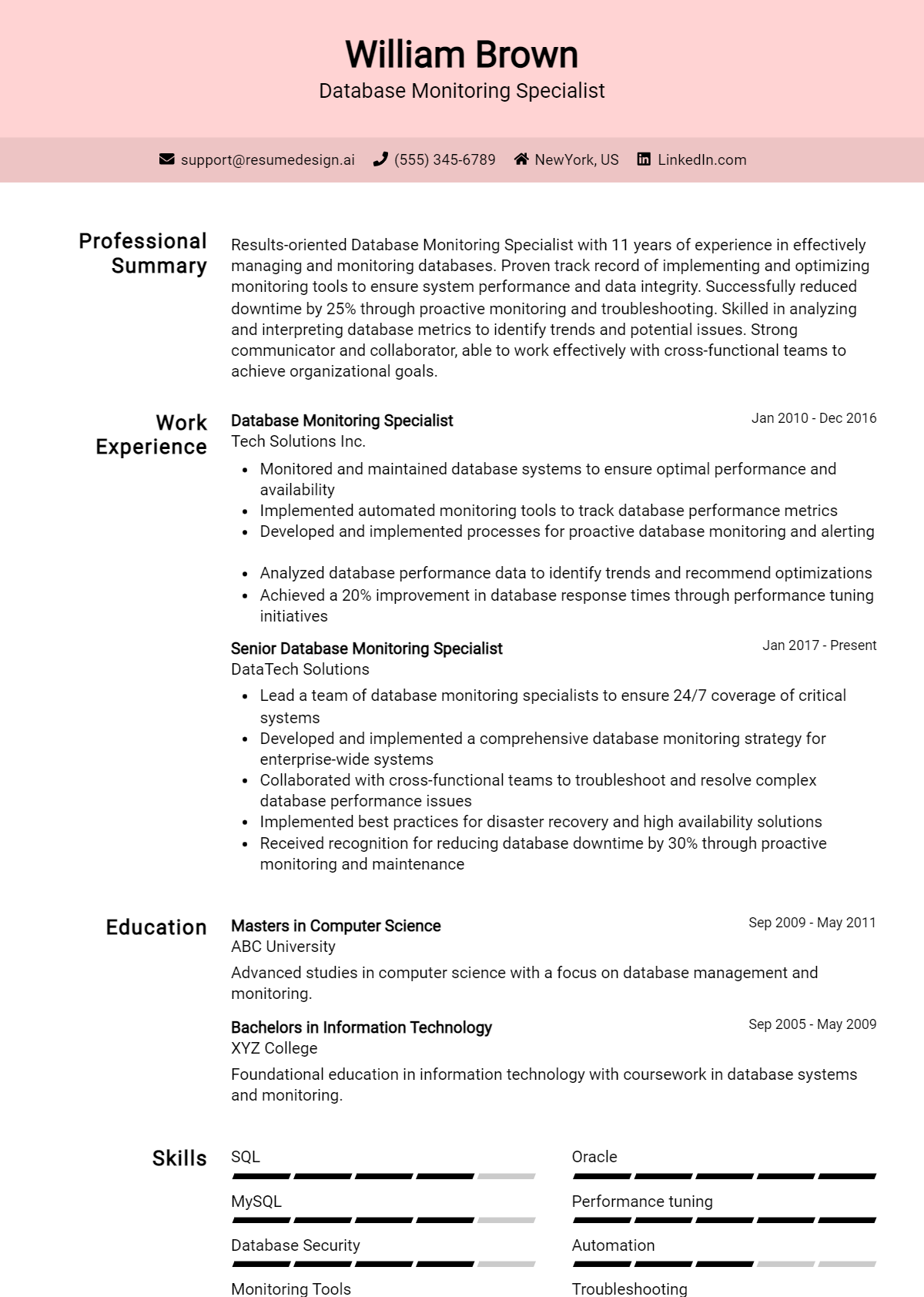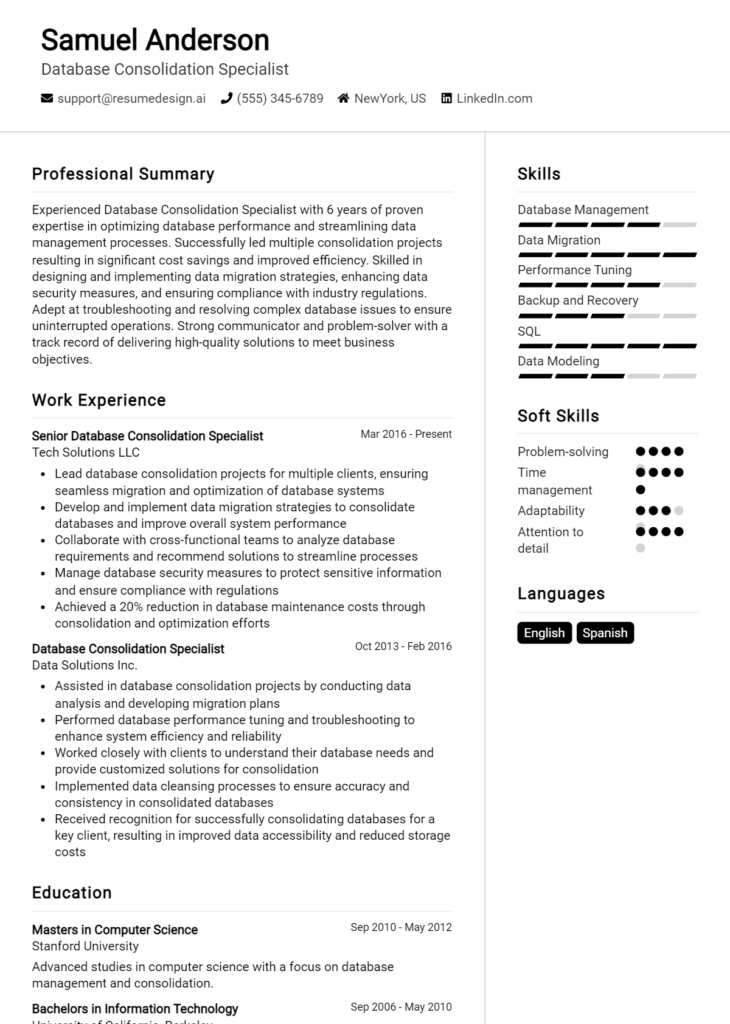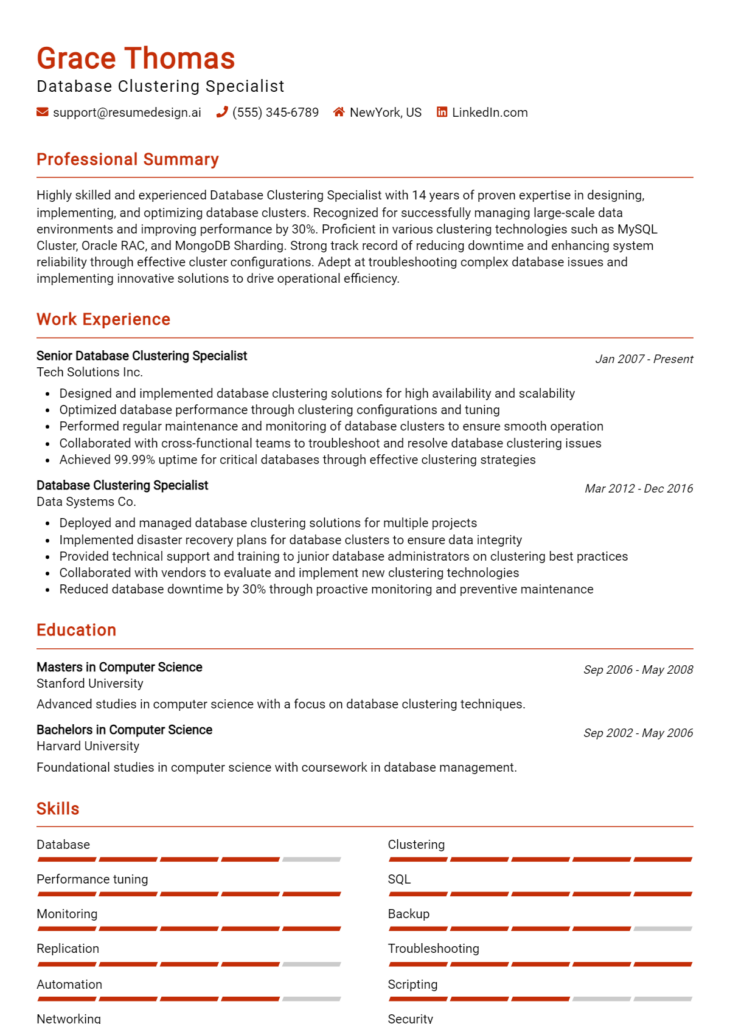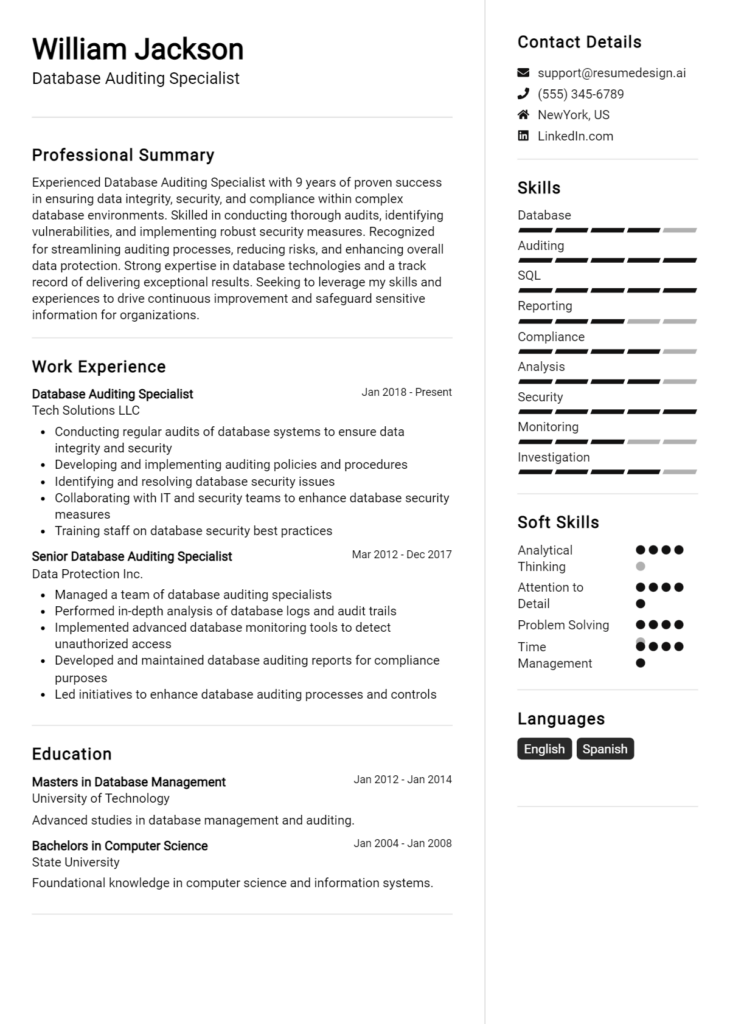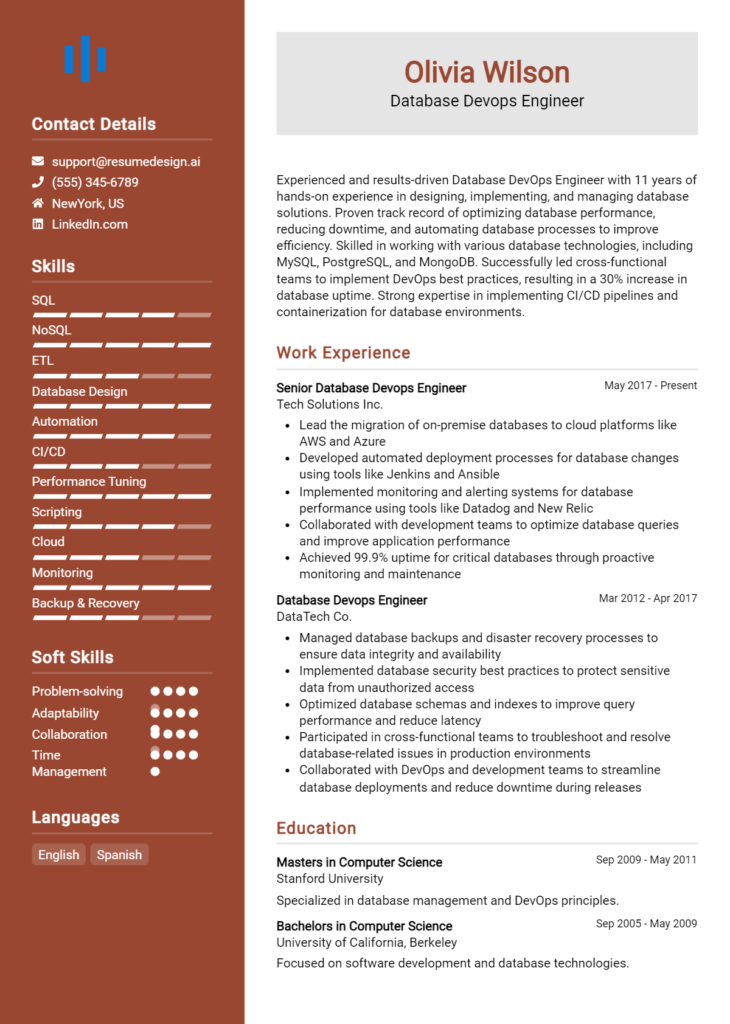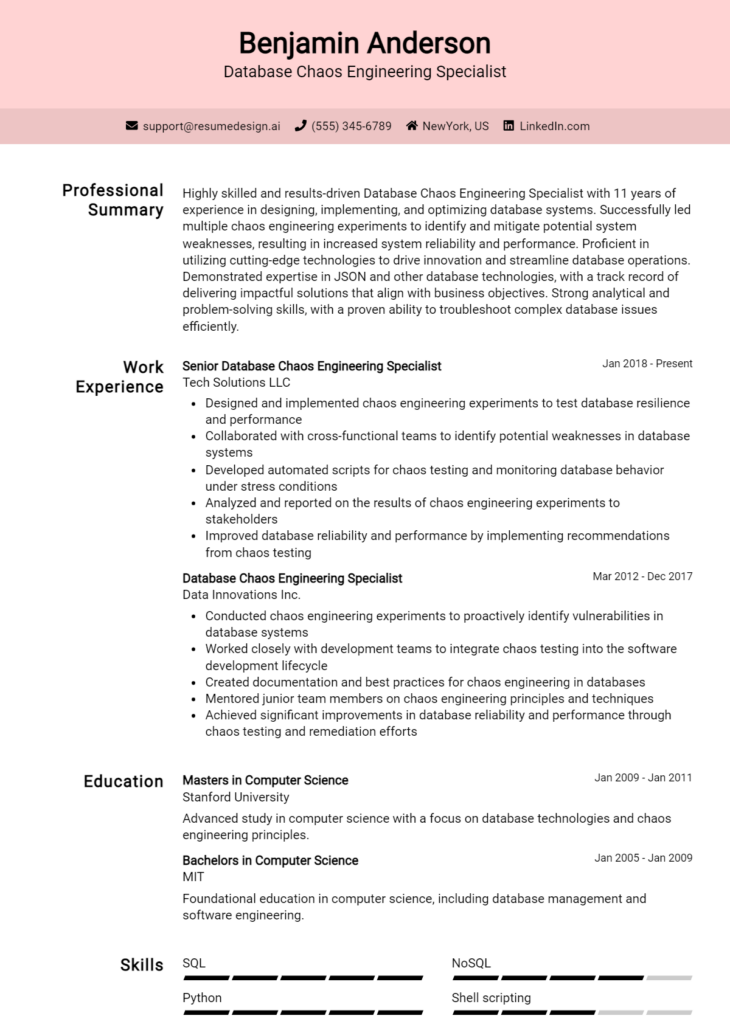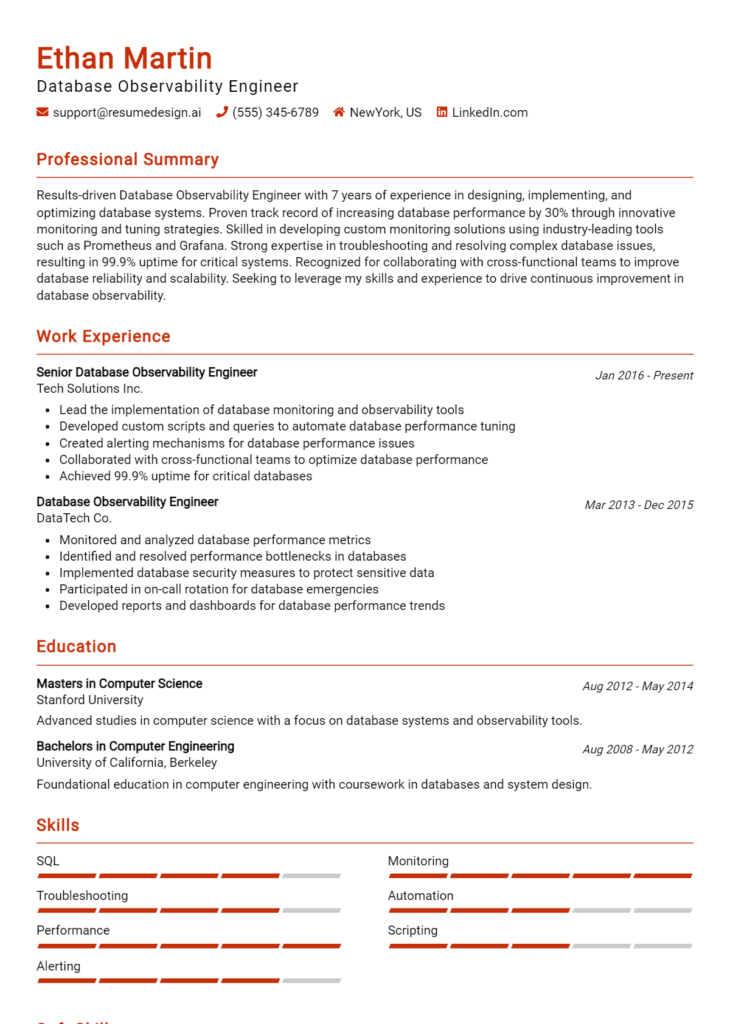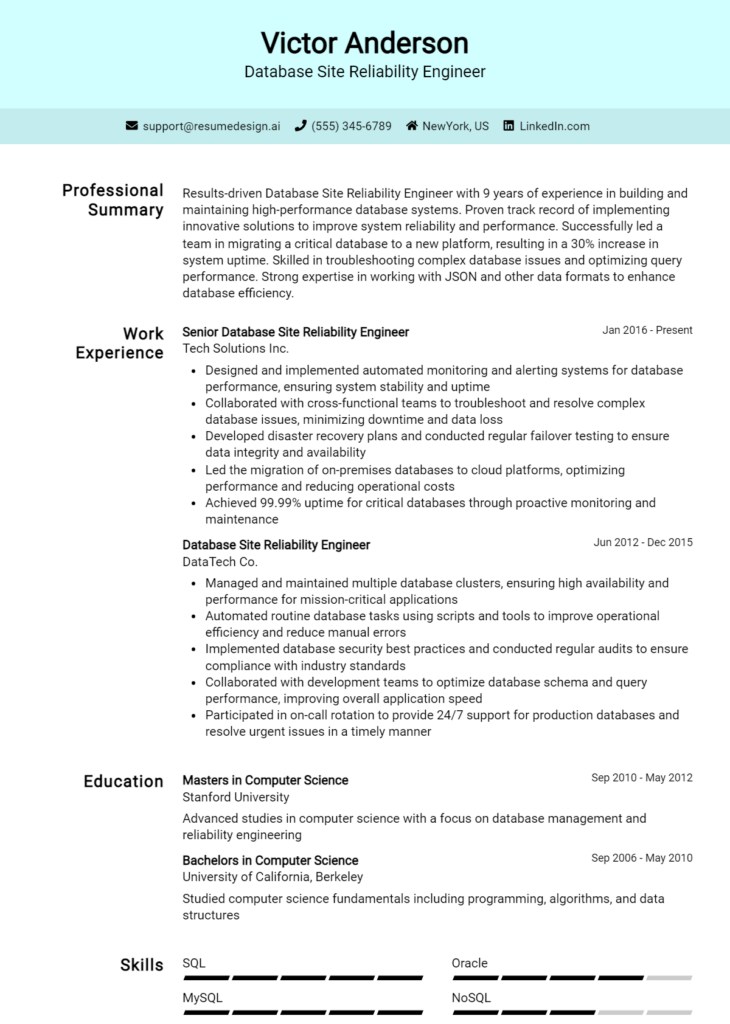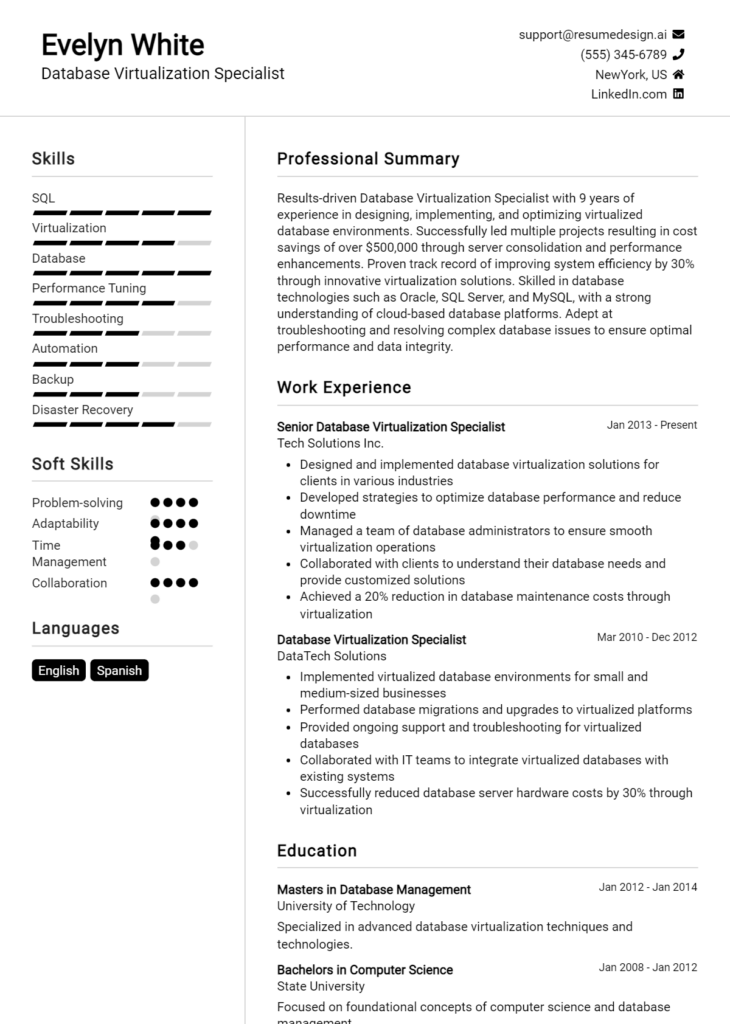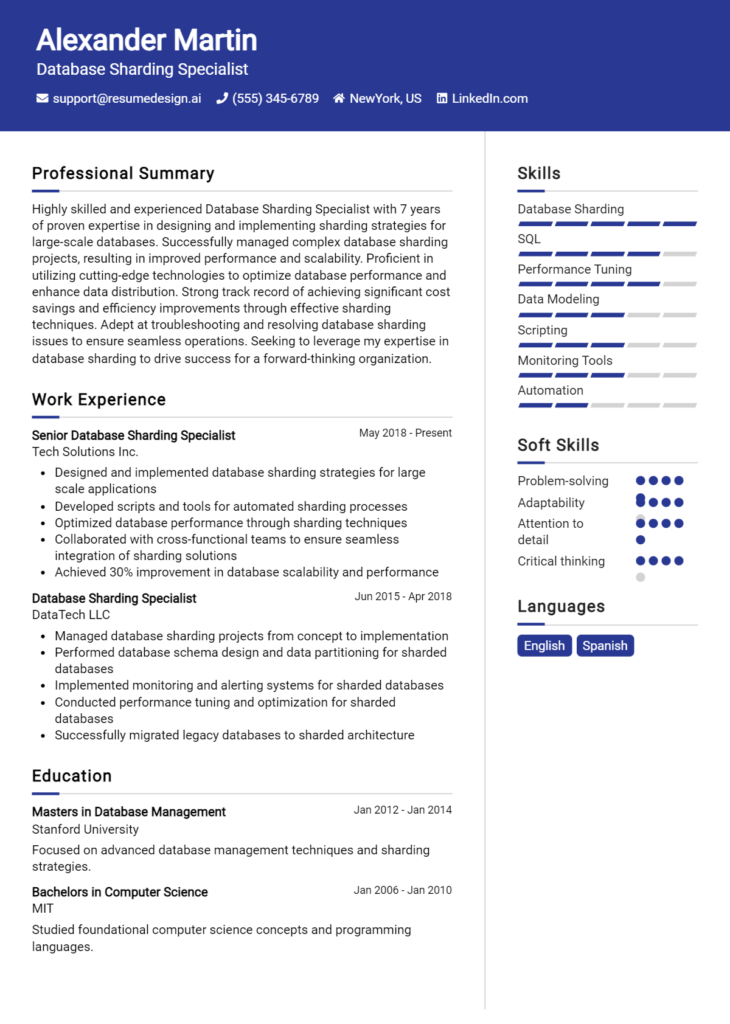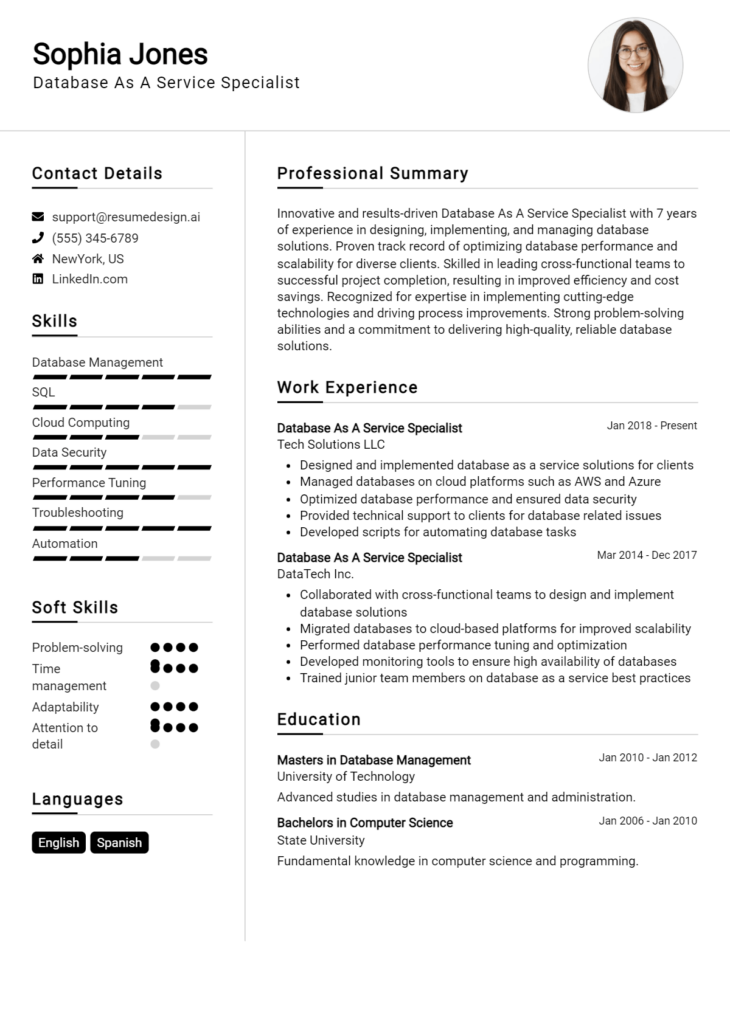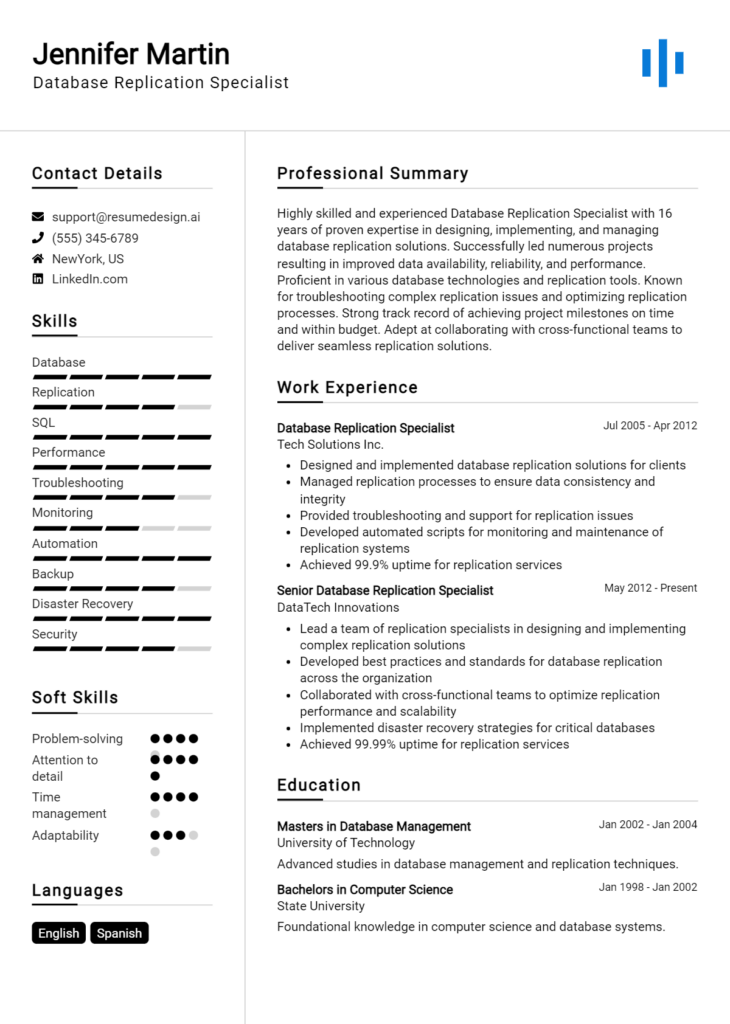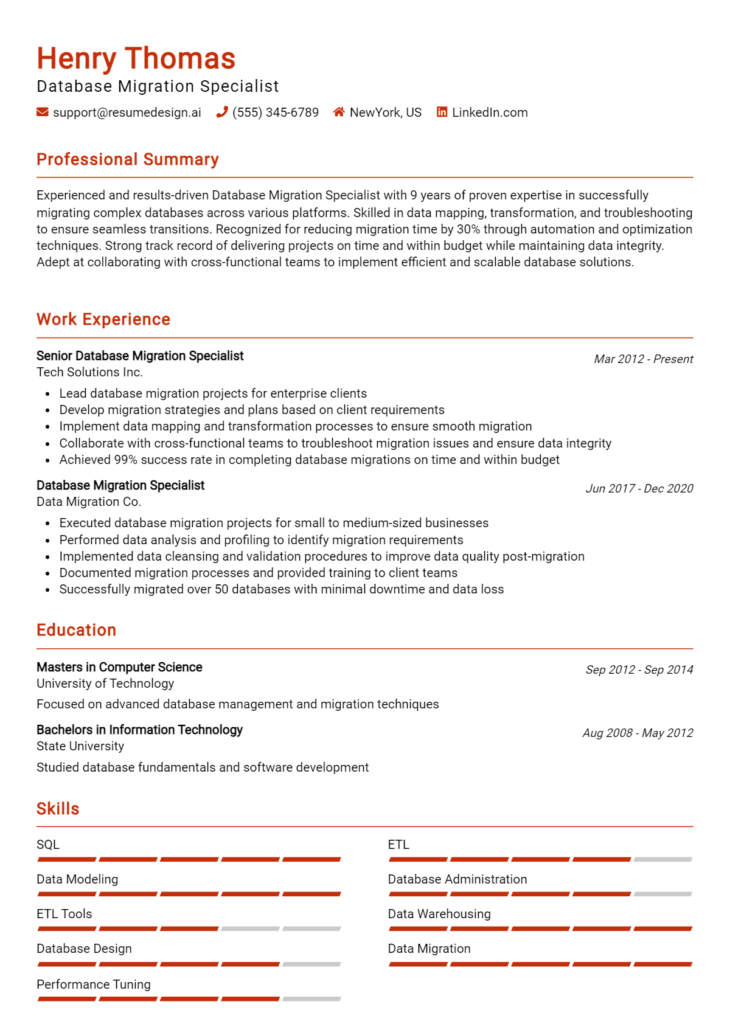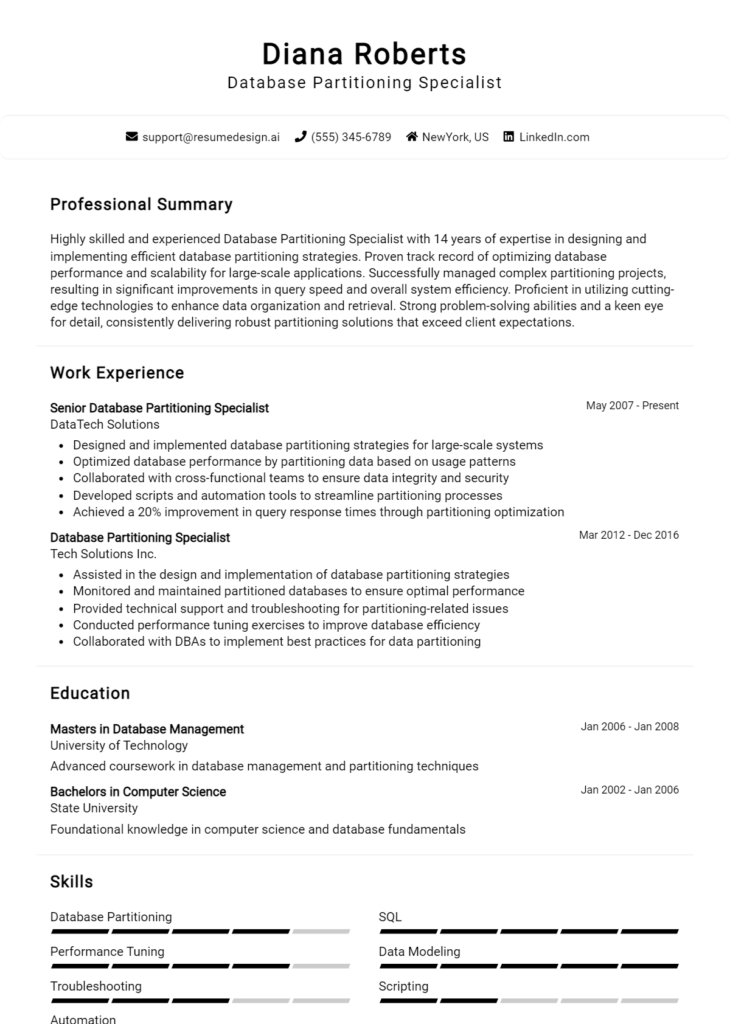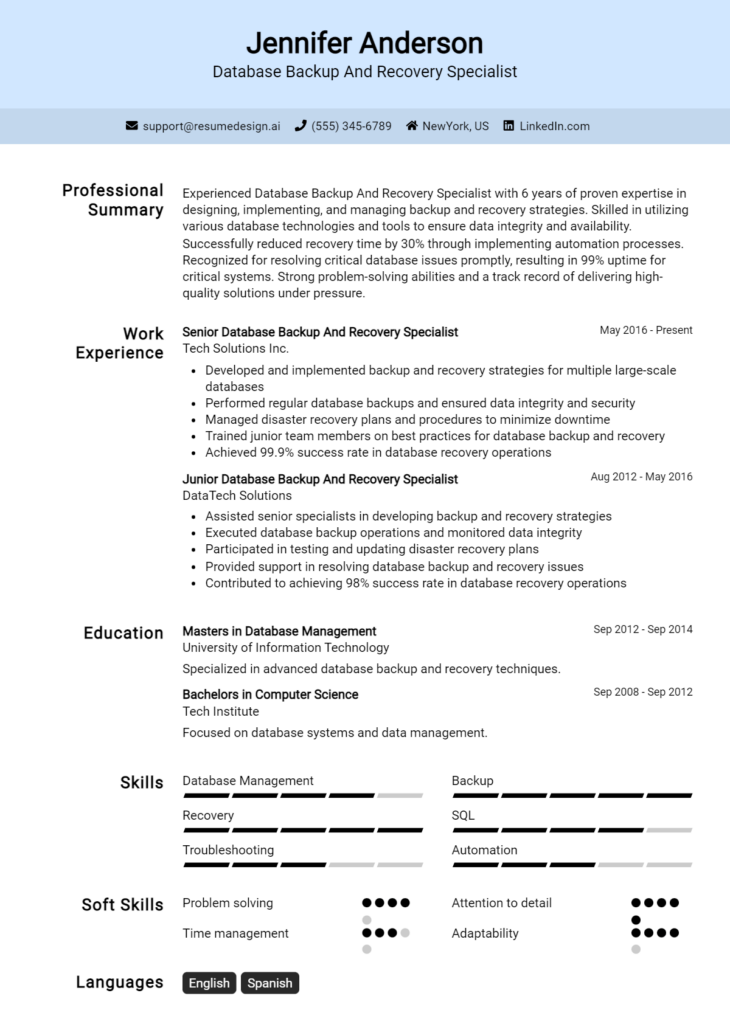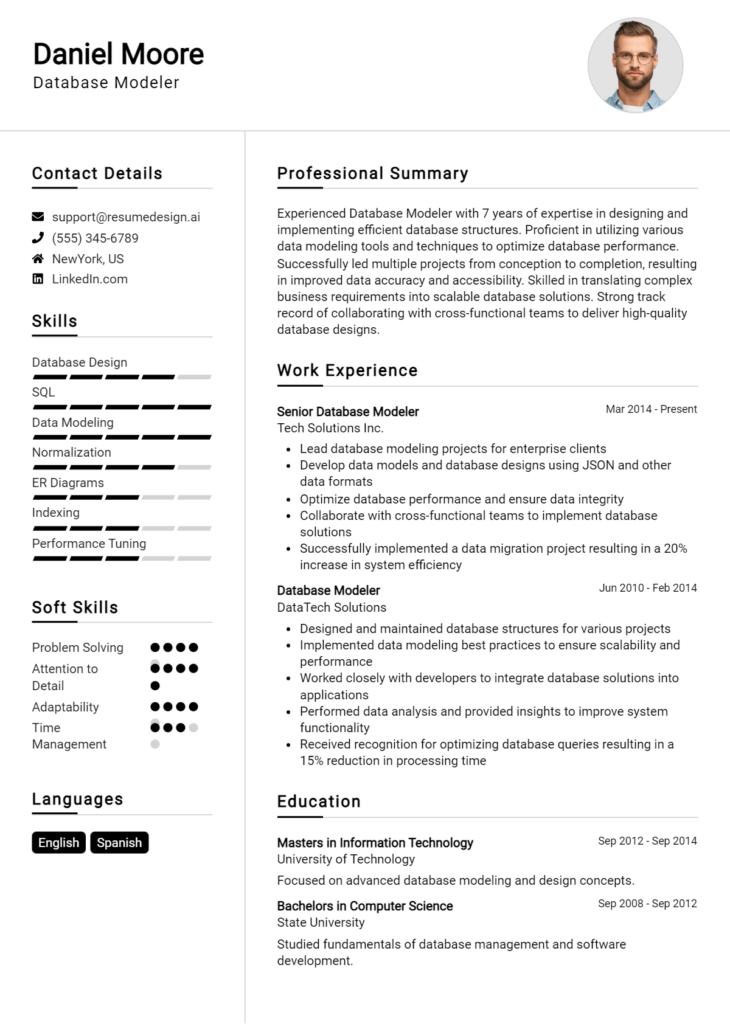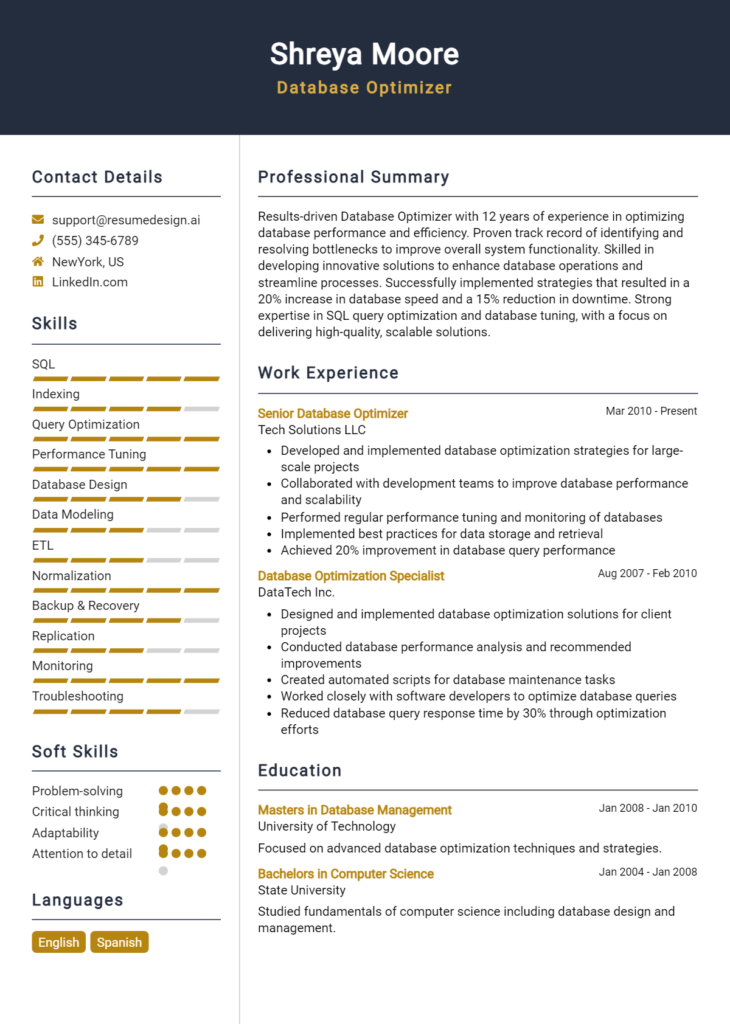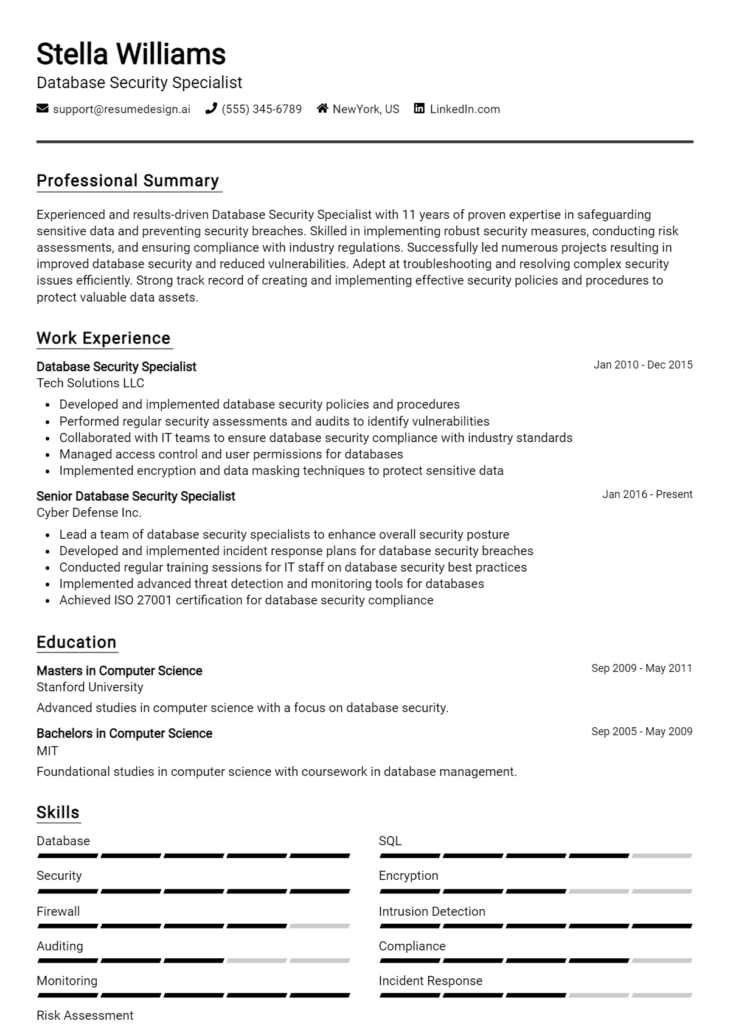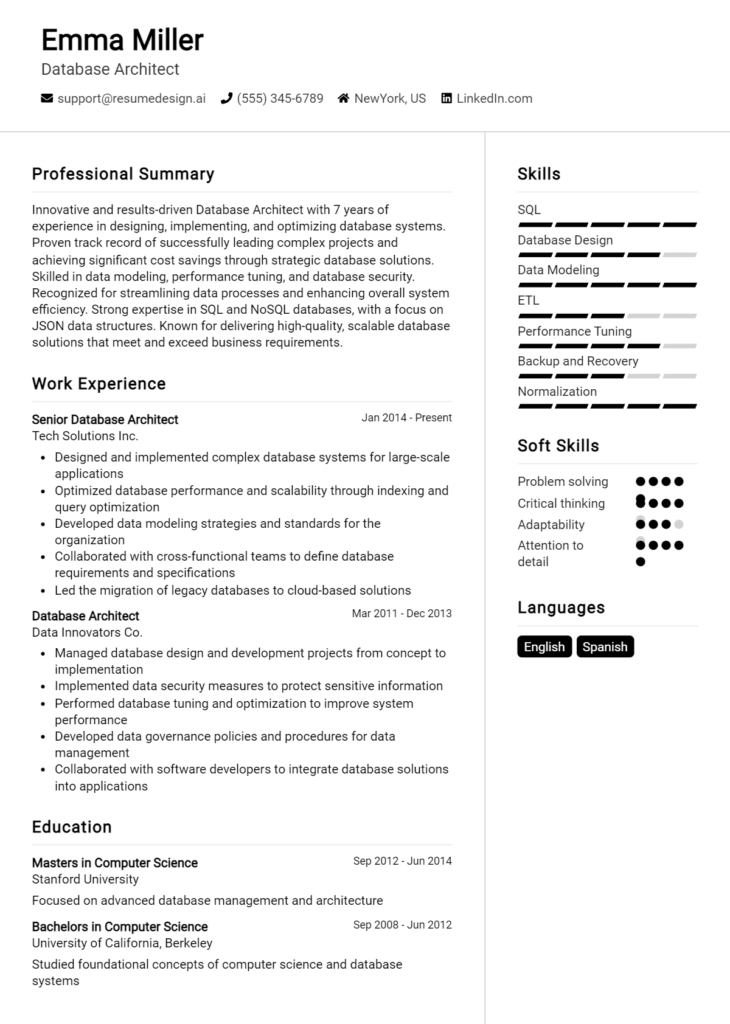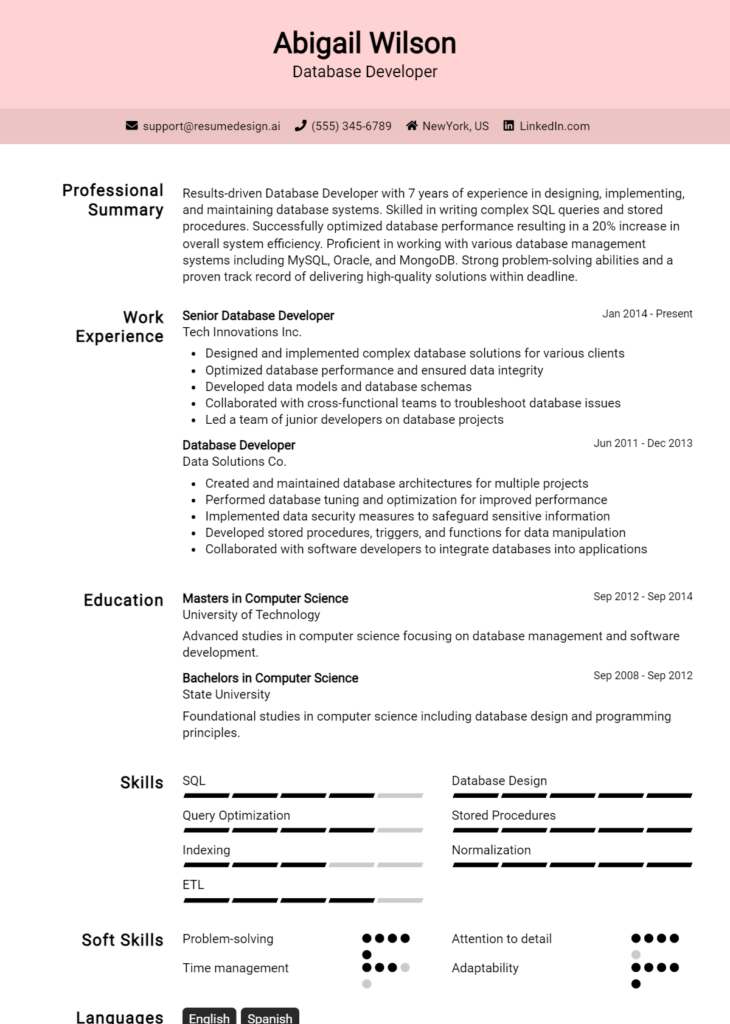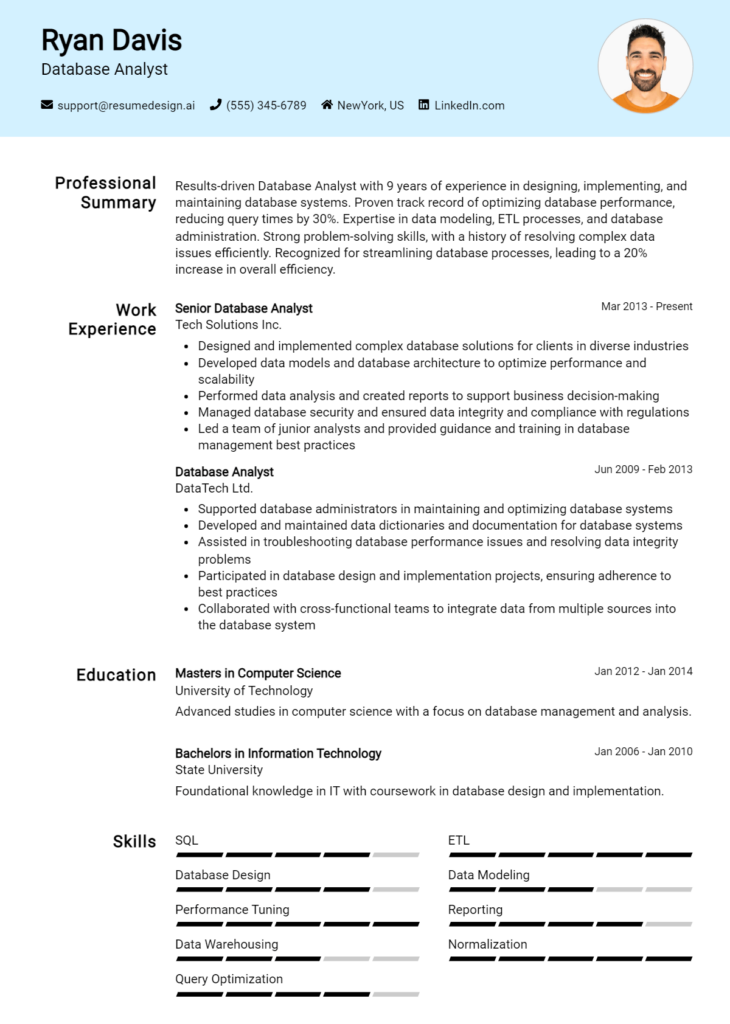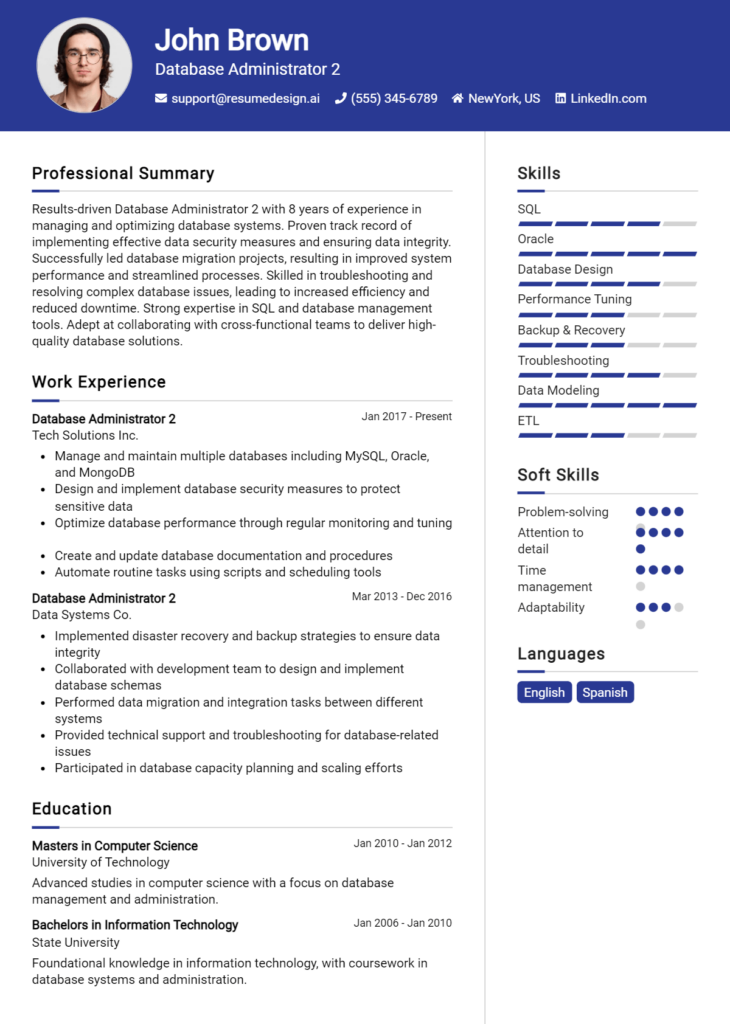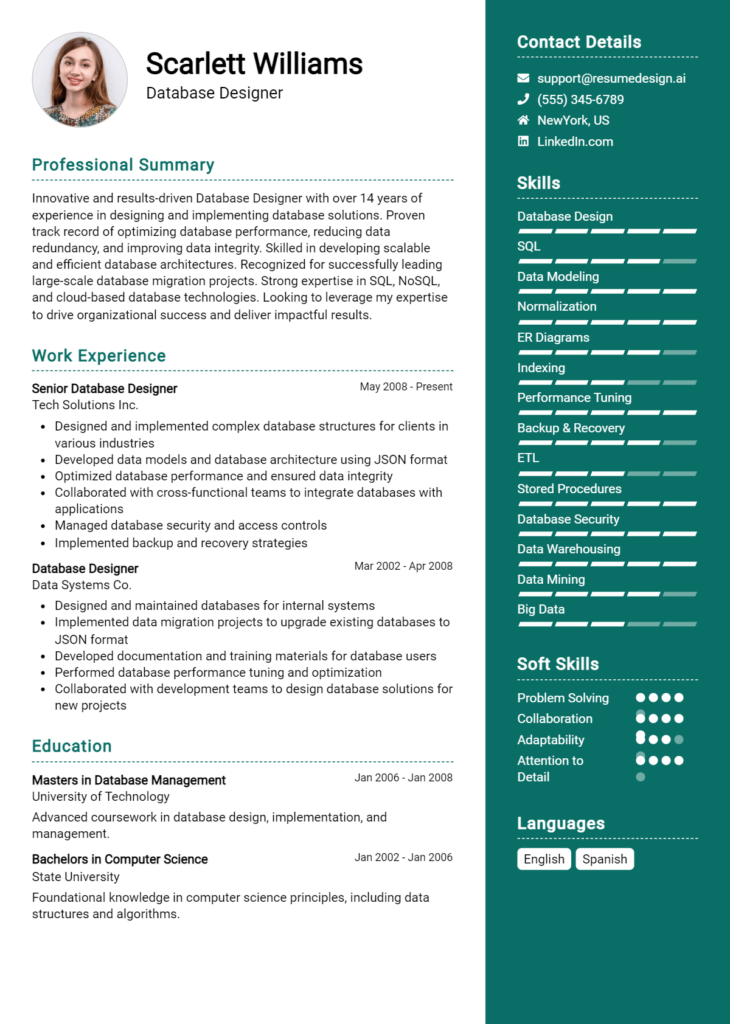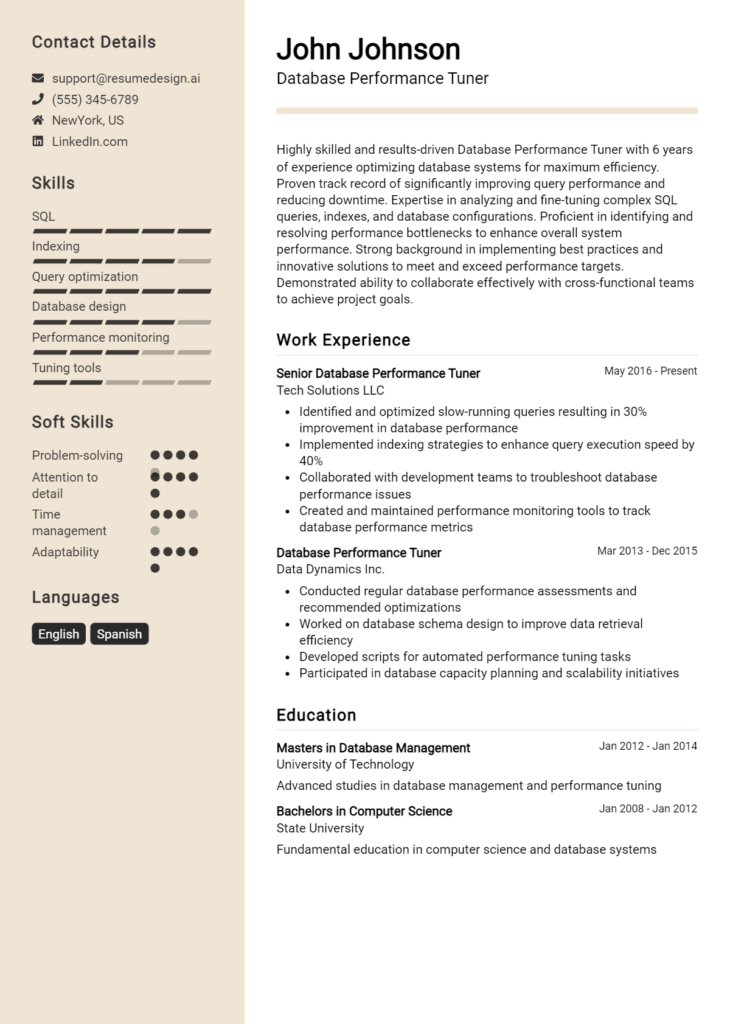Database Monitoring Specialist Core Responsibilities
A Database Monitoring Specialist is vital in ensuring optimal database performance and reliability, requiring a blend of technical and operational skills. Key responsibilities include monitoring database health, identifying performance bottlenecks, and troubleshooting issues, which necessitate strong problem-solving abilities. This role bridges IT with various departments by ensuring data accessibility and security, thereby supporting organizational goals. A well-structured resume highlighting these qualifications, including relevant certifications and experience, is essential for showcasing expertise in this critical position.
Common Responsibilities Listed on Database Monitoring Specialist Resume
- Monitor database performance and availability in real-time.
- Analyze and optimize database queries and processes.
- Implement backup and recovery solutions to safeguard data.
- Collaborate with development teams to improve database applications.
- Troubleshoot and resolve database-related issues promptly.
- Maintain database security and compliance standards.
- Generate performance reports and present findings to management.
- Conduct regular database health checks and audits.
- Coordinate with cross-functional teams to support data initiatives.
- Stay updated with industry trends and best practices.
- Document database configurations, changes, and procedures.
High-Level Resume Tips for Database Monitoring Specialist Professionals
A well-crafted resume is essential for Database Monitoring Specialist professionals, as it serves as the first impression a candidate makes on potential employers. In a field where attention to detail and technical expertise are crucial, your resume must effectively showcase not only your skills but also your achievements in database management and monitoring. A compelling resume can set you apart in a competitive job market, demonstrating your ability to maintain the integrity, performance, and security of complex database systems. This guide will provide practical and actionable resume tips specifically tailored for Database Monitoring Specialist professionals, helping you create a document that resonates with hiring managers.
Top Resume Tips for Database Monitoring Specialist Professionals
- Tailor your resume to the specific job description, using relevant keywords and phrases that align with the requirements of the position.
- Clearly highlight your experience with database monitoring tools and technologies, such as Oracle Enterprise Manager, SQL Server, or Nagios.
- Quantify your achievements wherever possible; for example, mention how you improved database performance by a specific percentage or reduced downtime.
- Include any certifications or relevant training, such as CompTIA Database+, Microsoft Certified: Azure Database Administrator Associate, or equivalent.
- Showcase your problem-solving skills by describing specific challenges you have faced in database monitoring and how you successfully resolved them.
- Emphasize your understanding of database security measures and compliance, detailing any experience with data protection policies.
- Utilize a clean, professional format that makes your resume easy to read and visually appealing, ensuring key information stands out.
- Incorporate soft skills such as teamwork, communication, and analytical thinking, as these are crucial for collaborating with IT teams and stakeholders.
- Keep your resume concise, ideally to one page, while ensuring it provides a comprehensive overview of your qualifications and experience.
By implementing these tips, you can significantly enhance your resume and increase your chances of landing a job in the Database Monitoring Specialist field. A well-structured and tailored resume not only showcases your qualifications but also demonstrates your commitment to excellence in database management, making you a standout candidate in the eyes of potential employers.
Why Resume Headlines & Titles are Important for Database Monitoring Specialist
In today’s competitive job market, crafting an effective resume is crucial, especially for specialized roles such as a Database Monitoring Specialist. A compelling resume headline or title serves as the first impression a hiring manager has of a candidate, allowing them to quickly gauge the applicant's relevance and qualifications for the role. A strong headline encapsulates the candidate’s key skills and experience in a concise and impactful manner, making it easier for hiring managers to identify suitable candidates among numerous applications. By ensuring the headline is relevant and directly related to the job being applied for, candidates can enhance their chances of standing out and securing an interview.
Best Practices for Crafting Resume Headlines for Database Monitoring Specialist
- Keep it concise: Aim for a headline that is brief and to the point, ideally no more than 10-12 words.
- Be role-specific: Use terminology that reflects the specific responsibilities and skills relevant to the Database Monitoring Specialist position.
- Highlight key strengths: Include specific skills or achievements that set you apart from other candidates.
- Avoid jargon: Use clear language that can be easily understood by hiring managers who may not be technical experts.
- Use action words: Start with strong action verbs that convey your capabilities and contributions.
- Tailor for each application: Customize your headline for each position to align closely with the job description.
- Focus on value: Emphasize how your skills and experience can benefit the potential employer.
- Keep it professional: Ensure the tone remains formal and fitting for the industry.
Example Resume Headlines for Database Monitoring Specialist
Strong Resume Headlines
Experienced Database Monitoring Specialist with Proven Skills in Performance Optimization
Database Performance Analyst Specializing in Proactive Monitoring and Issue Resolution
Detail-Oriented Database Monitoring Expert with 5+ Years in High-Stakes Environments
Weak Resume Headlines
Database Expert
Looking for a New Opportunity in IT
The strong headlines effectively convey specific qualifications and relevant experience, immediately communicating to hiring managers the candidate's suitability for the Database Monitoring Specialist role. They utilize industry-specific language and highlight key strengths, making them memorable and impactful. In contrast, the weak headlines are vague and generic, failing to provide any meaningful insight into the candidate's skills or experiences, which diminishes their potential to attract attention in a crowded job market.
Writing an Exceptional Database Monitoring Specialist Resume Summary
A resume summary is a crucial component for a Database Monitoring Specialist, as it serves as the first impression for hiring managers. This brief yet powerful section quickly captures attention by highlighting key skills, relevant experience, and notable accomplishments that align with the specific requirements of the role. An effective resume summary should be concise and impactful, tailored to the job description, and designed to entice the reader to delve deeper into the candidate's qualifications. By crafting a compelling summary, candidates can significantly enhance their chances of standing out in a competitive job market.
Best Practices for Writing a Database Monitoring Specialist Resume Summary
- Quantify Achievements: Use numbers and metrics to demonstrate the impact of your work, such as database uptime percentages or performance improvements.
- Focus on Skills: Highlight the technical skills and tools you are proficient in, such as SQL, performance tuning, and monitoring software.
- Tailor to the Job Description: Customize your summary to reflect the specific requirements and keywords found in the job posting.
- Be Concise: Keep your summary brief, ideally 2-4 sentences, to maintain the reader's interest.
- Showcase Relevant Experience: Mention your years of experience and any specific industries you've worked in that relate to the position.
- Emphasize Problem-Solving Skills: Highlight your ability to identify and troubleshoot database issues effectively.
- Use Action Words: Start sentences with dynamic verbs to convey a sense of initiative and impact.
- Include Certifications: If you have relevant certifications (e.g., Oracle Certified Professional), mention them to enhance credibility.
Example Database Monitoring Specialist Resume Summaries
Strong Resume Summaries
Results-driven Database Monitoring Specialist with over 7 years of experience in optimizing database performance, achieving a 99.9% uptime across multiple platforms. Proficient in SQL, Oracle, and MongoDB, skilled at implementing monitoring tools that reduced query response times by 30%.
Dedicated Database Monitoring Specialist with a proven track record of enhancing data integrity and performance for Fortune 500 companies. Successfully led a team to migrate a legacy system to a cloud-based platform, improving data accessibility by 50% and reducing operational costs by 20%.
Detail-oriented Database Monitoring Specialist with 5 years of experience in performance tuning and troubleshooting. Recognized for developing proactive monitoring solutions that decreased system outages by 40%, ensuring seamless data operations.
Weak Resume Summaries
Experienced database professional looking for a new opportunity. I have worked with various databases and am familiar with monitoring tasks.
Database Monitoring Specialist with some experience and skills. I am a quick learner and can adapt to different environments.
The examples of strong resume summaries are effective because they clearly articulate specific achievements and skills relevant to the Database Monitoring Specialist role. They provide quantifiable results, demonstrate a thorough understanding of the job requirements, and showcase the candidate's direct contributions to previous employers. In contrast, the weak summaries lack detail and specificity, making them less impactful and memorable, which can hinder a candidate's chances of being noticed by hiring managers.
Work Experience Section for Database Monitoring Specialist Resume
The work experience section of a Database Monitoring Specialist resume is vital in demonstrating a candidate's technical acumen, leadership capabilities, and commitment to delivering high-quality database solutions. This section not only showcases specific skills in database monitoring tools and methodologies but also highlights the candidate's ability to manage teams effectively and drive projects to successful completion. By quantifying achievements and aligning experiences with industry standards, candidates can present a compelling narrative that illustrates their value to potential employers.
Best Practices for Database Monitoring Specialist Work Experience
- Highlight relevant technologies and tools used in database monitoring, such as SQL, Oracle, or specific monitoring software.
- Quantify results by including metrics such as improved performance percentages, reduced downtime hours, or enhanced data retrieval speeds.
- Demonstrate collaboration by detailing experiences working with cross-functional teams, such as developers and system administrators.
- Include specific examples of proactive monitoring actions taken that led to issue prevention or performance enhancements.
- Describe leadership experiences, such as mentoring junior team members or leading a project team.
- Align experiences with industry standards and best practices, showing familiarity with compliance regulations and data security measures.
- Use action verbs to convey impact and responsibility in your role.
- Tailor the work experience section to match the job description of the position being applied for.
Example Work Experiences for Database Monitoring Specialist
Strong Experiences
- Led a team of 5 in implementing a new database monitoring solution that resulted in a 40% reduction in system downtimes over six months.
- Developed and executed a proactive monitoring strategy that improved database query performance by 30%, significantly enhancing user experience.
- Collaborated with cross-functional teams to redesign the database architecture, which increased data retrieval speeds by 50% and improved overall system efficiency.
- Mentored two junior database analysts, resulting in a 25% increase in their productivity and quality of database management tasks.
Weak Experiences
- Worked on database projects and contributed to team efforts.
- Monitored databases to ensure they were functioning properly.
- Assisted in resolving some database issues as needed.
- Participated in meetings regarding database management.
The examples classified as strong clearly highlight quantifiable results, technical leadership, and effective collaboration, showcasing the candidate's ability to make significant contributions to their organization. In contrast, the weak experiences lack specificity and measurable outcomes, failing to convey the candidate's impact or demonstrate their skills effectively. Strong experiences reflect a proactive approach and tangible improvements, while weak experiences read as generic and unimpressive, making them less compelling to potential employers.
Education and Certifications Section for Database Monitoring Specialist Resume
The education and certifications section of a Database Monitoring Specialist resume is crucial for demonstrating the candidate's foundational knowledge, technical skills, and commitment to professional development. This section not only highlights the academic background of the applicant but also showcases any industry-relevant certifications and specialized training that align with the demands of the role. By providing details about relevant coursework, recognized credentials, and continuous learning efforts, candidates can greatly enhance their credibility and demonstrate their suitability for the position, thereby increasing their chances of standing out to potential employers.
Best Practices for Database Monitoring Specialist Education and Certifications
- Include only relevant degrees and certifications that pertain to database management and monitoring.
- Detail specific coursework that aligns with database technologies, monitoring tools, and performance optimization.
- Highlight industry-recognized certifications, such as Microsoft Certified: Azure Database Administrator Associate or Oracle Certified Professional.
- Emphasize continuous learning through online courses or workshops related to database monitoring and management.
- Use clear formatting to make information easily readable and accessible to hiring managers.
- Keep the section updated with any new certifications or degrees obtained.
- List certifications in order of relevance and recency to draw attention to the most important qualifications.
- Avoid including obsolete or non-technical certifications that do not contribute to the database monitoring role.
Example Education and Certifications for Database Monitoring Specialist
Strong Examples
- Bachelor of Science in Computer Science, University of Technology, 2021
- Microsoft Certified: Azure Database Administrator Associate, 2023
- Coursework: Database Management Systems, Data Warehousing, and SQL Optimization Techniques
- Oracle Certified Professional, Oracle Database 19c, 2022
Weak Examples
- Associate of Arts in General Studies, Community College, 2019
- Certification in Basic Computer Skills, 2020
- Coursework: Introduction to Art History
- Certified in Microsoft Office Suite, 2021
The strong examples are considered effective because they directly relate to the skills and knowledge required for a Database Monitoring Specialist, showcasing relevant degrees and certifications that validate the candidate's expertise. In contrast, the weak examples include irrelevant qualifications that do not pertain to database monitoring or management, thereby failing to demonstrate the candidate's readiness for the role and potentially detracting from the overall impression they make on hiring managers.
Top Skills & Keywords for Database Monitoring Specialist Resume
A well-crafted resume for a Database Monitoring Specialist is crucial for showcasing not only technical expertise but also interpersonal abilities that are essential in this role. The right blend of hard and soft skills can significantly enhance a candidate's marketability, as they demonstrate both the technical acumen needed to manage and monitor databases effectively and the communication skills necessary to collaborate with team members and stakeholders. Highlighting these skills can help potential employers quickly identify your fit for the role, making it imperative to tailor your resume accordingly. For more information on how to effectively present your skills, check out these resources on skills and work experience.
Top Hard & Soft Skills for Database Monitoring Specialist
Soft Skills
- Attention to Detail
- Problem-Solving Skills
- Effective Communication
- Team Collaboration
- Time Management
- Adaptability
- Analytical Thinking
- Critical Thinking
- Customer Service Orientation
- Proactive Mindset
- Conflict Resolution
- Interpersonal Skills
- Stress Management
- Initiative
- Empathy
Hard Skills
- SQL Proficiency
- Database Performance Tuning
- Database Backup and Recovery Techniques
- Monitoring Tools (e.g., Nagios, Zabbix)
- Data Modeling
- ETL Processes
- Database Security Management
- Cloud Database Management (e.g., AWS, Azure)
- Scripting Languages (e.g., Python, Bash)
- Data Warehousing Concepts
- Troubleshooting Database Issues
- Knowledge of NoSQL Databases
- Familiarity with Database Design Principles
- Capacity Planning
- Data Migration Techniques
- Performance Monitoring Software
- Understanding of RDBMS (e.g., Oracle, SQL Server)
Stand Out with a Winning Database Monitoring Specialist Cover Letter
I am writing to express my interest in the Database Monitoring Specialist position at [Company Name], as advertised on [Job Board/Company Website]. With a robust background in database management and a keen eye for detail, I am excited about the opportunity to contribute to your team. My experience in monitoring database performance, troubleshooting issues, and implementing efficiency improvements aligns well with the requirements of this role.
In my previous position at [Previous Company Name], I successfully managed a diverse range of databases, ensuring optimal performance and availability. I developed and executed monitoring strategies that reduced downtime by 30% and improved query response times by implementing efficient indexing and partitioning techniques. My proficiency with tools such as SQL Server Management Studio, Oracle Enterprise Manager, and various monitoring software has equipped me with the skills necessary to identify and resolve potential issues before they affect business operations.
Collaboration is key in any technical role, and I pride myself on my ability to communicate complex technical concepts to non-technical stakeholders. I have worked closely with development and IT teams to assess database performance metrics and recommend enhancements, fostering a culture of continuous improvement. My proactive approach and commitment to quality assurance have been instrumental in maintaining the integrity and security of databases under my supervision.
I am eager to bring my expertise in database monitoring and optimization to [Company Name], helping to ensure that your systems run smoothly and efficiently. Thank you for considering my application. I look forward to the opportunity to discuss how my background and skills can contribute to the success of your database management efforts.
Common Mistakes to Avoid in a Database Monitoring Specialist Resume
When crafting a resume for a Database Monitoring Specialist position, it’s essential to present your skills and experiences effectively. Unfortunately, many candidates make common mistakes that can hinder their chances of landing an interview. By being aware of these pitfalls, you can create a more compelling resume that highlights your qualifications and expertise in database monitoring.
Neglecting Relevant Keywords: Failing to include industry-specific terms and keywords can result in your resume being overlooked by applicant tracking systems (ATS) that filter resumes based on specific criteria.
Vague Job Descriptions: Providing unclear or generalized descriptions of past roles can make it difficult for hiring managers to assess your exact contributions and achievements in database monitoring.
Overlooking Technical Skills: Not emphasizing technical skills, such as familiarity with SQL, performance tuning, or monitoring tools, can make you seem less qualified for the role.
Ignoring Certifications: Omitting relevant certifications, such as those from Microsoft, Oracle, or AWS, can weaken your credibility and demonstrate a lack of commitment to professional development in the field.
Inconsistent Formatting: A resume that lacks a consistent format can appear unprofessional and make it challenging for employers to quickly find the information they need.
Excessive Length: Including too much information or making your resume excessively long can overwhelm hiring managers. Aim for a concise presentation of your most relevant experiences and skills.
Failure to Quantify Achievements: Not providing measurable outcomes or specific achievements can diminish the impact of your contributions. Use metrics to illustrate how you improved database performance or reduced downtime.
Ignoring Soft Skills: Overemphasizing technical skills while neglecting soft skills, such as communication or teamwork, can present a one-dimensional view of your suitability for collaborative environments.
Conclusion
As a Database Monitoring Specialist, your role is crucial in ensuring that database systems operate efficiently and securely. From tracking performance metrics to diagnosing issues before they escalate, your expertise helps maintain data integrity and accessibility. Key responsibilities typically include monitoring database performance, implementing optimization strategies, and collaborating with IT teams to troubleshoot and resolve problems.
In today’s competitive job market, having a polished resume that highlights your skills and experience is essential. Consider reviewing your Database Monitoring Specialist resume to ensure it effectively showcases your qualifications and achievements.
To aid in this process, there are numerous resources available to help you create a standout application. Utilize resume templates to get started on a professional layout, or try using a resume builder for a more streamlined approach. For inspiration, explore resume examples that can guide you in structuring your content. Additionally, don’t forget the importance of a compelling introduction—check out cover letter templates to pair with your resume.
Take action today! Review your resume, leverage these resources, and enhance your chances of landing the Database Monitoring Specialist position you desire.

